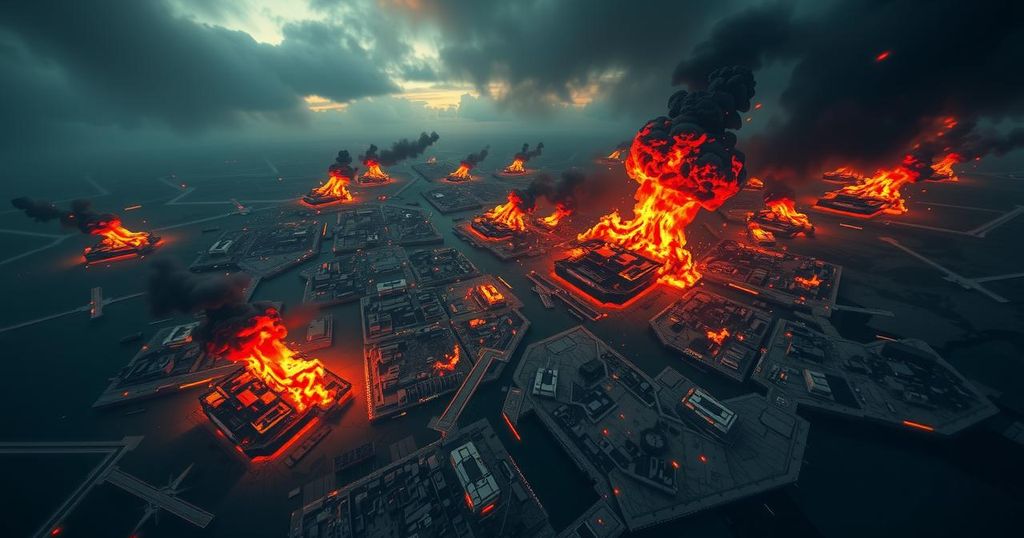Ongoing Diplomatic Efforts Amid Rising Conflict in the Middle East

U.S. diplomats are actively engaging in the Middle East to resolve the conflicts in Gaza and Lebanon, amid rising violence following Israeli airstrikes that have resulted in significant casualties. Iran is contemplating a response to these strikes, while the humanitarian situation in Gaza continues to deteriorate due to drastically reduced aid. Key discussions are centered around potential ceasefires and addressing the implications of recent Israeli legislation affecting humanitarian agencies.
U.S. officials are traveling to the Middle East to support efforts aimed at mitigating conflicts in Gaza and Lebanon, while also seeking to prevent a potential Iranian reaction to recent Israeli airstrikes. Lebanon’s Prime Minister, Najib Mikati, has expressed optimism regarding the prospect of a ceasefire between Israel and Hezbollah, suggesting it could be achieved within a short timeframe. Iran is reportedly contemplating a significant and painful response to the Israeli attacks, with the potential action expected to occur prior to the upcoming U.S. presidential election. The White House has advised Iran against taking retaliatory measures, emphasizing U.S. readiness to assist Israel’s defensive needs. Recent Israeli airstrikes in Lebanon resulted in the deaths of at least 19 individuals, according to Lebanese health officials. In the face of these attacks, Israel has mandated evacuation orders for the city of Baalbek, which also houses historic Roman sites. On the humanitarian front, aid delivery to Gaza has sharply decreased, with United Nations reports indicating that only 836 aid trucks entered the region in October, a stark contrast to the pre-war average of approximately 500 trucks per day. The ongoing military actions have also severely impacted medical services in northern Gaza, where the last operational hospital has been targeted, resulting in further casualties among the local population. Key discussions involving senior U.S. officials are focused on engaging with regional stakeholders to address the complex dynamics of the conflict and to explore avenues for peace with Hezbollah, Hamas, and Iranian officials. Amid the challenging landscape, an Israeli airstrike on Beit Lahiya has drawn considerable condemnation, following the tragic loss of numerous civilian lives, including children. The UN Security Council has raised significant concerns over Israel’s recent legislative moves to restrict operations of the United Nations Relief and Works Agency (UNRWA), which plays a crucial role in providing humanitarian assistance to Palestinian refugees. This decision is anticipated to exacerbate dire living conditions in Gaza, where reliance on UNRWA services is profound. In summary, as U.S. officials engage in diplomacy to curb escalating tensions in the region, the humanitarian ramifications of the ongoing violence remain severe, prompting calls for urgent international intervention to address the dire humanitarian crisis in Gaza and to facilitate a sustainable ceasefire in Lebanon.
The ongoing conflict in the Middle East, particularly in Gaza and Lebanon, has drawn international attention as escalating violence has led to significant humanitarian crises. Israeli airstrikes have intensified, leading to rising casualties and prompting fears of broader regional instability, especially with Iran’s involvement. The United States is actively engaged in diplomatic efforts to address these conflicts and has been involved in discussions aimed at fostering ceasefires and deterring Iranian retaliation. The humanitarian situation in Gaza has reached alarming levels, marked by a sharp decline in aid provision and dire medical conditions following relentless bombardments.
The situation in the Middle East, particularly in Gaza and Lebanon, remains precarious, marked by devastating airstrikes and a concerning humanitarian crisis. While diplomatic efforts are underway, the need for urgent action to stabilize the region and alleviate human suffering is paramount. The international community, particularly the United States, plays a crucial role in addressing these complex challenges, with an emphasis on facilitating ceasefires and expanding humanitarian access.
Original Source: www.cnn.com






